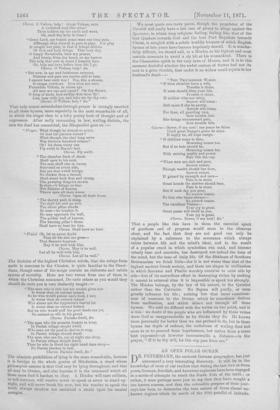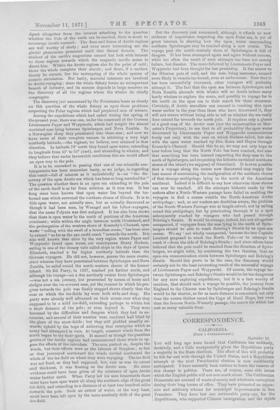AN OPEN POLAR OCEAN.
DR. PETERMANN;the eminent German geographer, has just announced a very interesting discovery. It will be in the knowledge of most of our readers that during the last two or three years, German, Swedish, and American explorers have been engaged in a series of attempts to reach the North Pole of the earth ; or rather, it were perhaps more just to say that they have sought a less barren success, and that the ostensible purpose of their jour- neys has been to determine the true nature of those almost un- known regions which lie north of the 80th parallel of latitude.
Apart altogether from the interest attaching to the question whether the Pole of the earth can be reached, there is much to encourage Arctic research. The flora and fauna of Arctic regions are well worthy of study ; and even more interesting are the glacial phenomena presented amid that dismal domain. The student of the earth's magnetism cannot but look with interest to those regions towards which the magnetic needle seems to direct him. Within the Arctic regions also lie the poles of cold ; there the winds complete their circuit ; and there, if a modern theory be correct, lies the mainspring of the whole system of -oceanic circulation. But lastly, material interests are involved in Arctic voyaging ; since the whale fishery forms no unimportant 'branch of industry, and its success depends in large measure on the discovery of all the regions where the whales do chiefly congregate.
The discovery just announced by Dr. Petermann bears as closely on this question of the whale fishery as upon those problems .respecting the Polar regions which had perplexed men of science.
Among the expeditions which had sailed during the spring of the present year, there was one, under the command of the German Lieutenants Payer and Weyprecht, which had sought the almost unvisited seas lying between Spitzbergen and Nova Zembla. In a Norwegian sloop they penetrated into these seas ; and now we Cave news of their complete success in attaining a very high uortherly latitude,—the highest, we believe, ever attained in that direction. In latitude 78° north they found open water, extending in longitude from 42° to 60° (east), and abounding in whales; and they believe that under favourable conditions this sea would afford an open way to the pole.
It is to be remarked in passing that one of our scientific con- temporaries has been somewhat hasty, as we judge, in regarding this result—full of interest as it undoubtedly is—as " the dis- • oovery of the open Arctic sea which has been so long searched for." The question whether there is an open sea extending to the pole 'of the earth itself is as far from solution as it ever was. It has long since been known that open water lies beyond the ice- bound seas which surround the northern shores of Siberia. It is to this open water, not actually seen, but as actually discovered as though it had been seen, by Wrangel and his fellow-voyagers, that the name Polynia was first assigned. It has also been shown that there is open water Iso the north of portions of the American 'continent ; while within the angle between north Greenland, and the prolongation of the western shore of Kennedy's Channel, open water " rolling with the swell of a boundless ocean," has been seen to extend " as far as the eye could reach " towards the north. It is also well known that close by the very region where Payer and Weyprecht found open water, our countryman Henry Hudson, reselling in one of the clumsy tubs called ships in the days of Queen Elizabeth, reached a far higher northerly latitude than the 'German voyagers. He did not, however, pursue the same course, 'since whereas they have penetrated between Spitzbergen and Nova ,Zembla, he sailed round the north-western shores of the former island. Sir Ed. Parry, in 1827, reached yet farther north, and although his voyage—on a due northerly course from Spitsbergen —was not a sea journey, but prosecuted by means of boats and 'sledgea over the ice-covered seas, yet the mannerin which his pro- gress towards the polo was finally stopped shows clearly that the seas on which the ice-fields lay were both wide and deep. His party were already well advanced on their course over what they .supposed to be a solid ice-field, extending perhaps to within but :a short distance of the pole ; or even beyond it. 'They were harassed by the difficulties and dangers which they had to en- counter, and several of their number were rendered half blind by the glare of the snow-fields ; but they still plodded steadily on- wards, upheld by the hope of achieving that enterprise which so many had attempt° I in vain. At length, constant winds from the north began to try their spirit. It seemed as though the guardian genius of the Arctic regions had commissioned these winds to op- pose the efforts of the intruders. The men pushed on, despite the winds, but their efforts were as the labours of Sisyphus ; as fast as they journeyed northward the winds carried southward the whole of the ice-field on which they were voyaging. The ice-field was not fixed, as they had supposed, but, vast as was its extent Auld thickness, it was floating on the Arctic seas. No surer 'evidence could have been given of the existence of open Arctic 'twitter farther north. When Parry led his men homewards there must have been open water all along the northern edge of the great 'ice-field, and extending to a distance of at least two hundred miles rto wards the pole. Such an extent of water, at the very least, must have been left open by the mere southerly drift of the great ice-field.
But the discovery just announced, although it affords no new evidence of importauce respecting the open Polar sea, is yet of great interest, in allowing how the open, water surrounding northern Spitsbergen may be reached along a new course. The voyage past the north-westerly shore of Spitzbergen is full of dangers. It has been attempted again and again without success, while too often the result of such attempts has been not merely failure, but disaster. The route followed by Lieutenants Payer and Weyprecht had been thought far less promising. It lies nearer to the Siberian pole of cold, and the seas, being narrower, seemed more likely to remain ice-bound, even at midsummer. Now that it has been successfully traversed, other voyagers will probably attempt it. The fact that the open sea between Spitzbergen and Nova Zembla abounds with whales will no doubt induce many hardy whalers to explore the route, and possibly to voyage far to the north on the open sea in their search for these creatures. Certainly, if Arctic travellers can succeed in reaching this open water earlier in the year than those who have discovered it, they will not return without being able to tell us whether the sea really does extend far towards the north pole. It requires only a glance at a good map of the Arctic seas (not the monstrosities on Mer- cator's Projection), to see that in all probability the open water discovered by Lieutenants Payer and Weyprecht communicates freely not only with the seas on which Hudson sailed, but also with the open water reaohed by Drs. Kane and Hayes through Kennedy's Channel. Should this be so, we may not only hope to hear before long that the North Pole has boon reached, but also that something has been learned respecting the deep seas to the north of Spitzbergen, and respecting the hitherto unvisited northern shores of the island (we suppose) of Greenland. It is even possible that a voyage along the course now discovered may supply the best means of ascertaining the configuration of the northern shores of that strange archipelago lying to the north of the American continent. Indeed it is difficult to say how otherwise those shores can ever be reached. All the attempts hitherto made by the seekers after a North-Western passage have failed in enabling the voyagers to find a course outside the North-American Arctic archipelago ; and, as our readers are doubtless aware, the problem of the North-Western Passage was at length solved, not by sailing round this archipelago, but by penetrating through it to a spot subsequently reached by voyagers who had passed through Behring's Straits. It would be strange, indeed, but not altogether unexpected, if voyagers from the seas lying to the north of Spitz- bergen should be able to reach Behriug's Straits by an open-sea course. We say not wholly unexpected,' because the late Captain Lambert proposed to reach the North Pole—or to attempt to reach it—from the side of Behriug's Straits ; and since others have believed that the pole could be reached from the direction of Spitz- bergen, we might infer, by combining the two theories, that an open-sea communication exists between Spitzbergen and Behring's Straits. Should this prove to be the case, the discovery would certainly not be the least interesting result of the successful voyage of Lieutenants Payer and Weyprecht. Of course, the voyage be- tween Spitzbergen and Bebring's Straits would be far too dangerous for any save exploring expeditions ; but it is a fact worthy of mention, that should such a voyage be possible, the journey from England to the Chinese seas by Spitzbergen and Behring's Straits would be far shorter, so far as mere distance is concerned, not only than the course thither round the Cape of Good Hope, but even than the famous North-Westerly passage, the search for which has cost so many valuable lives.



































 Previous page
Previous page